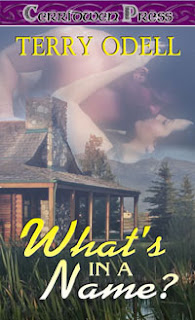
I was Googling and found my first review for What's in a Name? A nice surprise.
Romance Reader at Heart.
WHAT?S IN A NAME? by Terry Odell is a well-written, intriguing novel filled with plot twists and turns that kept me riveted from beginning to end. It is all that a romantic mystery should be, and then some. ....
WHAT?S IN A NAME? by Terry Odell is a suspense-filled tale that unites strangers, uncovers deceptions and shows that love, regardless of the names of its participants, knows no bounds. I enjoyed every word, and if romance with a hearty helping of suspense appeals to you, you'll love it, too.
.....Kay James


